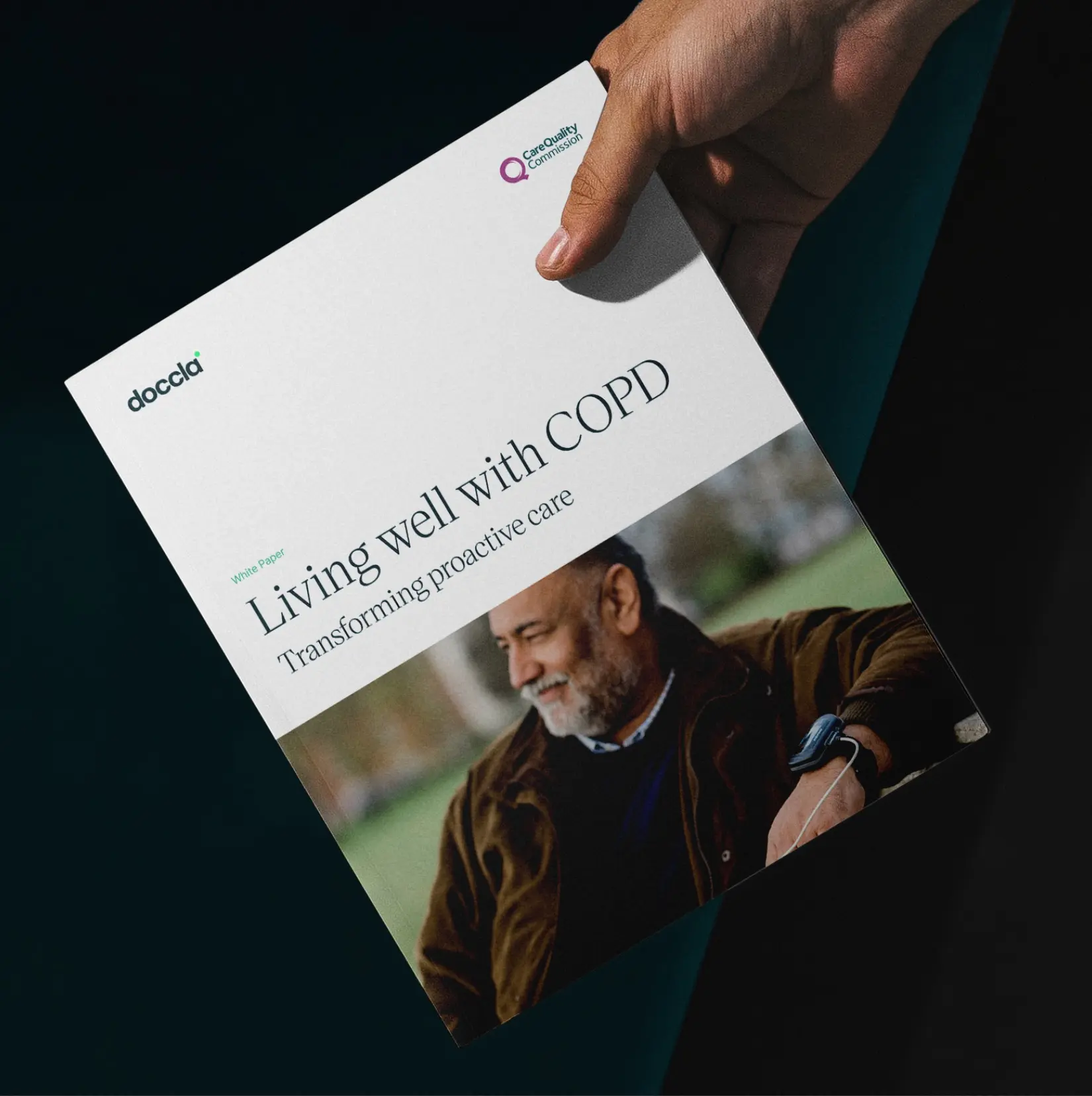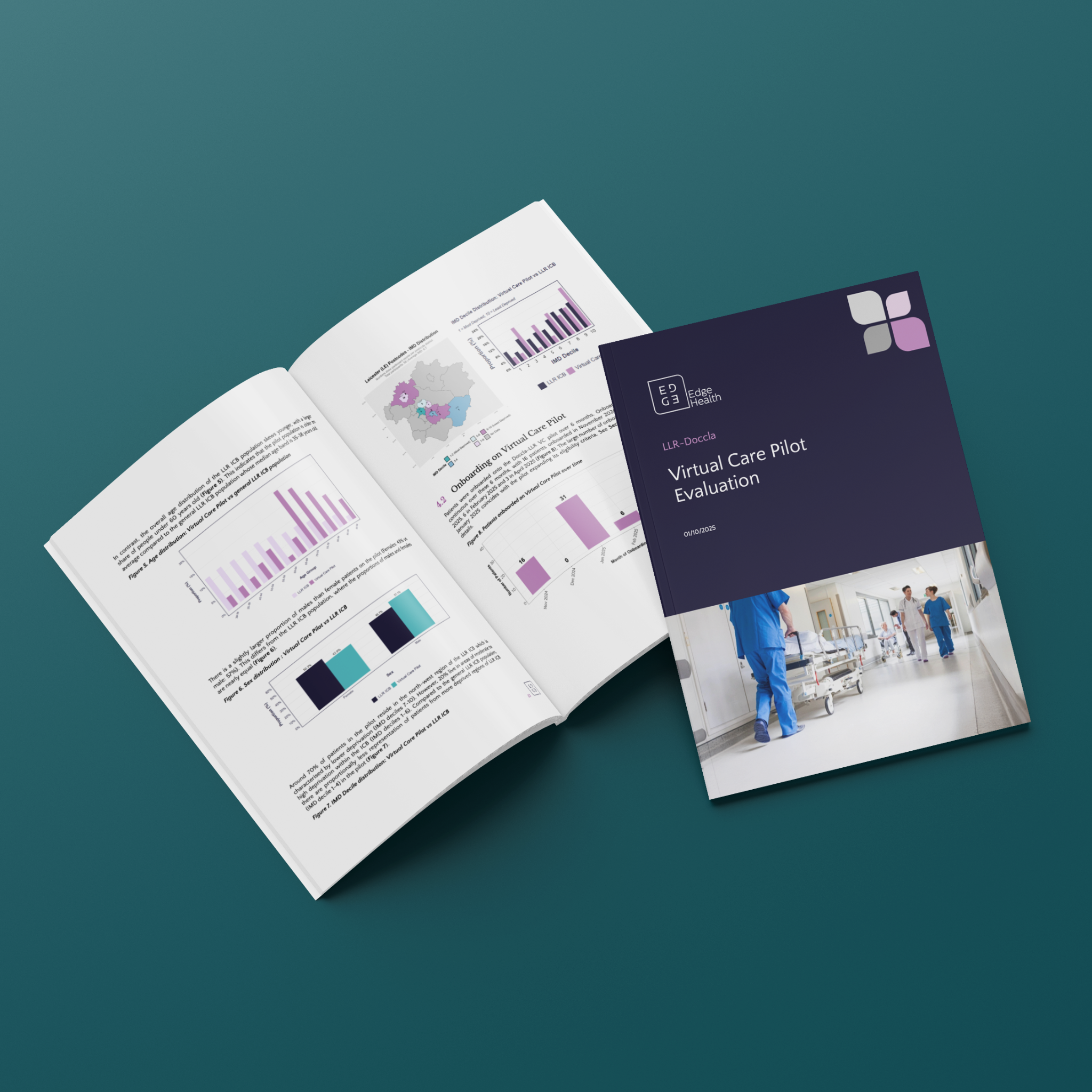Introduction
Respiratory diseases, including acute infections and chronic conditions, are a leading cause of morbidity, mortality and economic burden in England1 and one of the most common reasons for an emergency admission to hospital.
Acute respiratory infections (ARI) such as pneumonia, flu, and respiratory syncytial virus are responsible for 4.25 million deaths worldwide each year 2. In addition, in the UK alone, 5.4 million people have asthma and approximately 1.17 million people in England have been diagnosed with COPD3. Respiratory admissions increase markedly in the winter months and are the leading cause of winter pressures.
These result in a significant strain on health-resource with an associated economic burden. For example, a study conducted in the UK found that the direct medical cost of ARI equated to £86 million each year4, whilst the annual economic burden of asthma and COPD on the NHS in the UK is estimated as £3 billion and £1.9 billion respectively5.
This case study shows how, working with a wide range of NHS partners, Doccla uses cutting-edge, tech-enabled remote patient monitoring solutions to significantly improve respiratory pathways.
This results in reduced costs, whilst freeing up healthcare resources and optimally care for patients in the comfort of their own home, achieving excellent patient and clinician satisfaction.
Tackling the Problem
Working with NHS partners, Doccla has now established both acute and chronic tech-enabled respiratory pathways in 19 NHS sites in the UK across 37 respiratory pathways. A number of services provide support for Admission prevention and others enable Early discharge.
London
- Barts Health NHS Trust
- Central and North West London NHS Foundation Trust
- North West London ICB
- One Health Lewisham Integrated Community Provider
South West England
- Bath and North East Somerset, Swindon and Wiltshire ICB
- Bristol, North Somerset and South Gloucestershire ICB
- Living Well with COPD
- Gloucestershire ICB
- Somerset NHS Foundation Trust
East of England
- Cambridgeshire Community Services
- Essex Partnership University NHS Foundation Trust
- Hertfordshire Community Trust
East Midlands
- Derby and Derbyshire ICB
- Kettering General Hospital
- Northampton General Hospital
South East England
- East Kent Hospitals University NHS Foundation Trust
- Solent - Portsmouth Community Trust
North West England
- Northern Care Alliance NHS Foundation Trust
Yorkshire and The Humber
- South Yorkshire ICB
31 of the pathways are for patients with an acute respiratory illness and allow patients to recover safely and optimally from the comfort of their own home following an acute exacerbation, enabling community-based care that helps avoid an acute admission to hospital. In addition, these acute pathways unlock earlier discharge of patients from high-risk acute settings to their home, where they are at lower risk of hospital acquired deconditioning and nosocomial infections, better set-up for recovery and return to their normal lives.
The six chronic respiratory pathways, including our flagship ‘Living Well with COPD’ programme in Bristol, empower patients to take a proactive approach to managing their chronic respiratory conditions, allowing them to live healthier at home, preventing acute admissions in the first place.
Between December 2020 to April 2024, we have helped 3,821 patients with respiratory conditions either get home from hospital sooner or keep them out of hospital and safely at home. That equates to 66,357 patient active days away from NHS hospital beds and in the comfort of their own bed. And we keep growing, bringing proactive remote patient monitoring and virtual ward solutions to more sites and patients every day.
Freeing Up NHS Resources and Saving Money
From December 2020 to April 2024, Doccla’s tech-enabled respiratory pathways have saved the NHS 11,500 hours and 20,633 bed days; 5.4 bed days saved per patient on a respiratory pathways.
In total, these respiratory pathways have saved the NHS almost £8 million over this time period, £7,711,094, to be precise.
So how exactly has this been achieved?
Doccla’s respiratory pathways are evidenced to reduce acute hospital admissions and primary care interactions, as well as streamline costly and time-consuming tasks such as onboarding, compliance, observations, and clinical monitoring. Shifting these tasks away from busy, overworked NHS clinicians to our carefully trained and expert customer support agents and multi-disciplinary remote monitoring clinical team unlocks measurable value.
Clinical Monitoring
The Doccla respiratory clinical monitoring teams have directly saved NHS clinicians 180,992 minutes of their clinical time by undertaking thorough and focussed clinical assessments upon alerts, triaging and managing patients effectively, giving our NHS clinician partners the confidence, energy and time to attend to their other duties, such as providing care to the most unwell patients still in hospital. The value of this clinical time is £53 per patient supported which is £65,760 in total.
Onboarding
The onboarding service layer provided by the Doccla Customer Support team provides expert, diligent and empathetic onboarding of patients to all of the respiratory pathways. The Customer Support agents patiently talk through the process steps of each respiratory pathway and explain, in addition to on-demand tutorial videos, how to use each device to take their vital readings and submit them, often automatically via blue-tooth, for review by clinicians. This in itself has saved 149,538 minutes for the NHS or in other words, 40 minutes per patient on our respiratory pathways. Doccla’s onboarding service layer for respiratory pathways has therefore saved the NHS £54,332 worth of staff time.
Compliance
Our compliance service layer, again enabled by our diligent Customer Support team, ensures that every patient is not only onboarded to the respiratory pathways in a timely manner but keeps submitting day in day out and often, even multiple times a day, until they’re well enough to be discharged. Shifting this crucial and time-consuming responsibility away from NHS clinicians to this team has saved the NHS 32,505 minutes, equivalent to 8.5 minutes per patient on our respiratory pathways with this time valued at £11,180 for the NHS.
Observations
The aspect of this model that saves the NHS the most time, resource and money, is the tech-enabled remote patient monitoring solution that empowers patients to take and submit their own objective vitals and subjective observations.
The carefully selected and meticulously tested blue-tooth enabled medical devices, paired with the purpose-built, user friendly Doccla patient app teeming with powerful integrations and automations enable effortless collection of patient observations.
This aspect has saved the NHS 466,976 minutes or two hours and two minutes per patient on our respiratory pathways. This time saving equates to a cost saving of £169,668 for the NHS or in other words, £44.40 per patient on Doccla’s respiratory pathways, so far.
Primary care interactions
We have also sought to establish where clinical monitoring support is likely to have obviated a GP appointment, (or call to 111 or visit to hospital). To do this, we have reviewed the proportion of red alerts - that is patient reporting outside of agreed parameters - that required clinical input. Each of these have been reviewed against criteria to assess whether it is likely that without monitoring support that individual would have needed to make a GP appointment. The assessment was that in 9.8% of times it would have been likely, although this may be conservative.
Based on this estimate, these pathways have helped avoid 3,881 GP appointments, equating to over one GP appointment avoided per patient on our respiratory pathways, freeing up valuable GP time for other patients.
The value of this clinical time is £159,133, or £41.65 saved per patient on the home respiratory pathways over the measured time period.
Patient testimonial
Over 95% of patients on these respiratory pathways rate Doccla’s service as ‘good’ or ‘very good’, frequently stating that they ‘prefer it to hospital’, it ‘made them feel safe’, ‘more informed’ and ‘in control’ of their health.
This is what patients from our respiratory pathways had to say.
“Well, I thought it was brilliant, because I really don't like it in a hospital. Unfortunately, in the past months I picked up COVID in hospital. So [being on Doccla’s virtual ward] has been fantastic because it's allowed me to come home in my own environment…and I was able to be home with my husband. Because I have to look after him as well. ”
“ [Doccla gave us] the cover and the support. We didn't feel as though we were on our own and discharged from the hospital. It's allowed us to treat mum at home and feel that we've still got someone looking out for her.”
“I think my mum probably had more attention here than she would have got in the hospital.”
“The setting up was really good. The guy who set us up, he was fantastic. He was really patient, because we're a bit technophobic, aren't we? He talked us through everything and he was really patient, so we were really pleased.”
“Once I submitted the details, if there were any issues we had a phone call straight away and they checked-up. That was really reassuring.”
“So it was easy. Someone would phone back and say we're a bit concerned about this. Can you retake the blood pressure? Or can you retake [readings from] the oximeter? We felt very supported.”
“You know that someone's at the end of the phone to answer. It was very reassuring. It was very simple to use. And very effective. I thought it was brilliant.”
“I have my husband here, but it was very, very simple. The cuff that was sent was rather large. But one was immediately dispatched. So it came the day after it was ordered. So that was brilliant.”
“I would rate it very highly, I would rate it a 10, because I really struggle with technology, but this was very simple to follow.”
Conclusion
The progress that has been made in this collaboration with NHS partners has resulted in empowering patients to manage their chronic respiratory conditions, allowing them to live healthier at home and keeping them out of hospital.
At the same time, these services have unlocked early discharges, enabling patients to recover optimally from home. Since December 2020, our respiratory pathways have freed up NHS resources to the value of almost £8 million.
References
- Respiratory disease - Data - OHID. Accessed April 2, 2024. https://fingertips.phe.org.uk/profile/respiratory-disease/data#page/6/gid/1938133427/pat/15/par/E92000001/ati/6/are/E12000007/iid/93963/age/1/sex/4/cat/-1/ctp/-1/yrr/3/cid/4/tbm/1/page-options/car-do-0
- Mayor S. Acute respiratory infections are world’s third leading cause of death. BMJ. 2010;341(nov09 1):c6360-c6360. doi:10.1136/BMJ.C6360
- Kulakiewicz A, Baker C, Macdonald M. Support for people with chronic obstructive pulmonary disease. Accessed April 2, 2024. https://commonslibrary.parliament.uk/research-briefings/cdp-2021-0188/
- Meier GC, Watkins J, McEwan P, Pockett RD. Resource use and direct medical costs of acute respiratory illness in the UK based on linked primary and secondary care records from 2001 to 2009. PLoS One. 2020;15(8). doi:10.1371/JOURNAL.PONE.0236472
- Respiratory High Impact Interventions | NHS England












.png)









